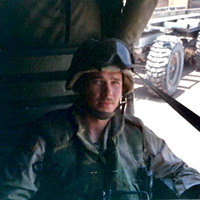Jeremey Shumaker, Army and Army Reserve Veteran
Regional Director, American Medical Response
In January 2003 when Jeremey’s tour was up and he was supposed to return to civilian life, he was required to stay in the Army for two more years under what’s known as a stop-loss order, where an enlisted man’s time of service is extended. When he got out in 2005, he was ready to leave the 3 a.m. physical training, eating MREs and having people shoot at him.
Jeremey went back to his hometown of Riverside, California, where he joined the local AMR base. He had previously worked for AMR in Rancho Cucamonga, CA, while in the Army Reserves in 2002. Working his way up the ranks, he now serves as the Regional Director for Ventura and Santa Barbara counties and CALSTAR in Santa Maria.
“I am confident that I would not be where I am today without the experience I gained in the military,” said Shumaker. “As a combat medic, the military is where I gained training and experience in EMS. I worked on an ambulance, as well as in hospitals and clinics. But beyond EMS, while in the Army I learned a lot about leadership. I had great examples of what a great leader looked like as well as examples of leaders I did not want to emulate.”
Rank Achieved
In his eight years of service, Shumaker attained the rank of Sergeant. Sergeants typically:
- Lead a team or a section
- Are first-line leaders who have the most direct impact on soldiers
- Oversee soldiers in their training and daily tasks
Area of Service
- Ft. Lewis, WA
- Ft. Riley, KS
- Baghdad, Iraq
Favorite Military Memory
“When I joined the Army as a medic, I assumed my job would be to treat my fellow soldiers,” said Shumaker. “When we got to Baghdad, we quickly found that the people living in the area around our base has no access to medical care. One of the most memorable experiences of my life was having the opportunity to run daily clinics for locals who needed care ranging from minor wounds, to surgery, to dental care. We got to know the community and were able to build trust with them.”
